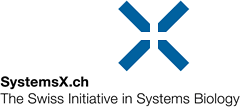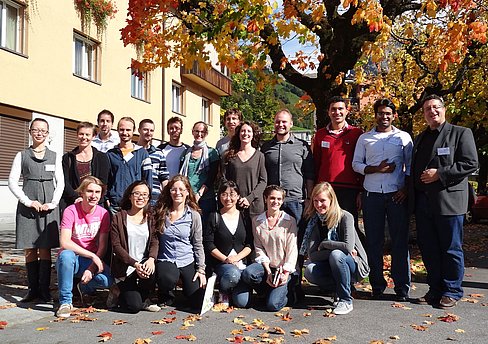PhD Retreat 2012: «It was mind-blowing!»
This year's PhD student retreat heralded a format change. For the first time, the classic elements of a retreat, such as scientific and personal exchanges, were combined with a topic of special relevance to PhD courses. This year there was an emphasis on "soft skills" to enable a successful presentation of students' own projects. That this format change was well received by the participants is also reflected in the feedback of PhD student Artur Yakimovich, UZH (standing, fourth from right above): "I've been to PhD retreats before, but I have to say that this retreat was an entirely different experience."
Practical issues and top speakers
The two renowned coaches, Sašo Kocevar and Hilde Janssens, conveyed their knowledge and useful concepts for a successful presentation to the participants, introducing and discussing following topics:
- Goal Definition: What do I want to achieve? What message I want to convey?
- How can I deliver a successful presentation / speech without digital tools?
- How do I use body language and voice effectively?
- How do I deal with stage fright?
- What if I have a blackout or freeze during a presentation?
For the PhD student Alina Isakova, EPFL (standing, first from left in group picture), the two coaches were absolutely convincing: "I would like to highlight the competence of our coaches Sašo and Hilde. The content of the workshop they gave and how they implemented it were fantastic."

Impressive moments and palpitations
The accompanying social program was also greatly appreciated. Alina Isakova will always remember the hiking tour: "The hiking trip to the glacier arranged by the retreat organizers was amazing." For her fellow student, Artur Yakimovich, it will be the palpitations he underwent on the climbing wall in Engelberg: "For me the high rope course was a high point. I got into some quite impressive situations, which challenged my fear of heights."
Next year, next opportunity
All in all, this year's PhD student retreat was a resounding success. It is evident from the feedback of the 17 participants that a similarly programmed structure is coveted for next year's retreat. Contributions that help to enhance the expertise of the professional and personal success should complement the scientific exchange. Even if the implementation of such issues is new for most doctoral students and therefore a challenge, they can only benefit from the experience they gain. Or to put it in Artur Yakimovich's own words: "I think that turning a PhD retreat into a boot-camp type of a course is an amazingly powerful idea."


